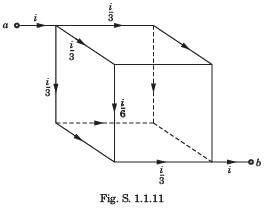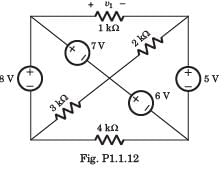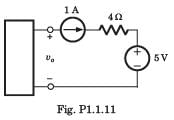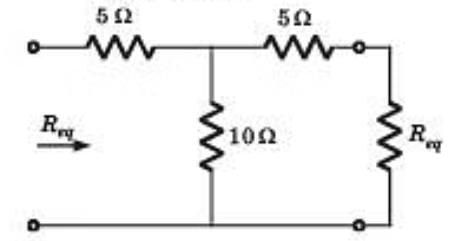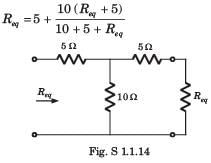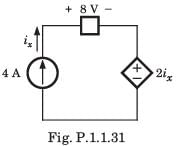Electrical Engineering (EE) Exam > Electrical Engineering (EE) Tests > Test: Basic Concepts - 2 - Electrical Engineering (EE) MCQ
Test: Basic Concepts - 2 - Electrical Engineering (EE) MCQ
Test Description
10 Questions MCQ Test - Test: Basic Concepts - 2
Test: Basic Concepts - 2 for Electrical Engineering (EE) 2025 is part of Electrical Engineering (EE) preparation. The Test: Basic Concepts - 2 questions and answers have been prepared
according to the Electrical Engineering (EE) exam syllabus.The Test: Basic Concepts - 2 MCQs are made for Electrical Engineering (EE) 2025 Exam.
Find important definitions, questions, notes, meanings, examples, exercises, MCQs and online tests for Test: Basic Concepts - 2 below.
Solutions of Test: Basic Concepts - 2 questions in English are available as part of our course for Electrical Engineering (EE) & Test: Basic Concepts - 2 solutions in
Hindi for Electrical Engineering (EE) course.
Download more important topics, notes, lectures and mock test series for Electrical Engineering (EE) Exam by signing up for free. Attempt Test: Basic Concepts - 2 | 10 questions in 30 minutes | Mock test for Electrical Engineering (EE) preparation | Free important questions MCQ to study for Electrical Engineering (EE) Exam | Download free PDF with solutions
Test: Basic Concepts - 2 - Question 1
Twelve 6Ω resistor are used as edge to form a cube. The resistance between two diagonally opposite corner of the cube is
Detailed Solution for Test: Basic Concepts - 2 - Question 1
Detailed Solution for Test: Basic Concepts - 2 - Question 2
Detailed Solution for Test: Basic Concepts - 2 - Question 3
Detailed Solution for Test: Basic Concepts - 2 - Question 4
Detailed Solution for Test: Basic Concepts - 2 - Question 5
Test: Basic Concepts - 2 - Question 6
A capacitor is charged by a constant current of 2 mA and results in a voltage increase of 12 V in a 10 sec interval. The value of capacitance is
Detailed Solution for Test: Basic Concepts - 2 - Question 6
Test: Basic Concepts - 2 - Question 7
The energy required to charge a 10 μF capacitor to 100 V is
Detailed Solution for Test: Basic Concepts - 2 - Question 7
Test: Basic Concepts - 2 - Question 8
The current in a 100 μF capacitor is 1mA. If capacitor is initially uncharged, then the waveform for the voltage across it is
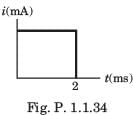
Detailed Solution for Test: Basic Concepts - 2 - Question 8
Test: Basic Concepts - 2 - Question 9
The voltage across a 100 μF capacitor is shown in fig. P.1.1.35. The waveform for the current in the capacitor is

Detailed Solution for Test: Basic Concepts - 2 - Question 9
Test: Basic Concepts - 2 - Question 10
The waveform for the current in a 200 μF capacitor is shown in fig. P.1.1.36 The waveform for the capacitor voltage is
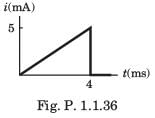
Detailed Solution for Test: Basic Concepts - 2 - Question 10
Information about Test: Basic Concepts - 2 Page
In this test you can find the Exam questions for Test: Basic Concepts - 2 solved & explained in the simplest way possible.
Besides giving Questions and answers for Test: Basic Concepts - 2, EduRev gives you an ample number of Online tests for practice
Download as PDF


